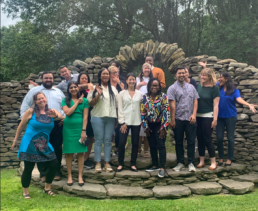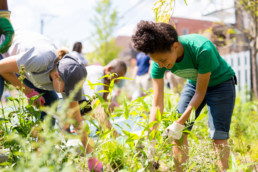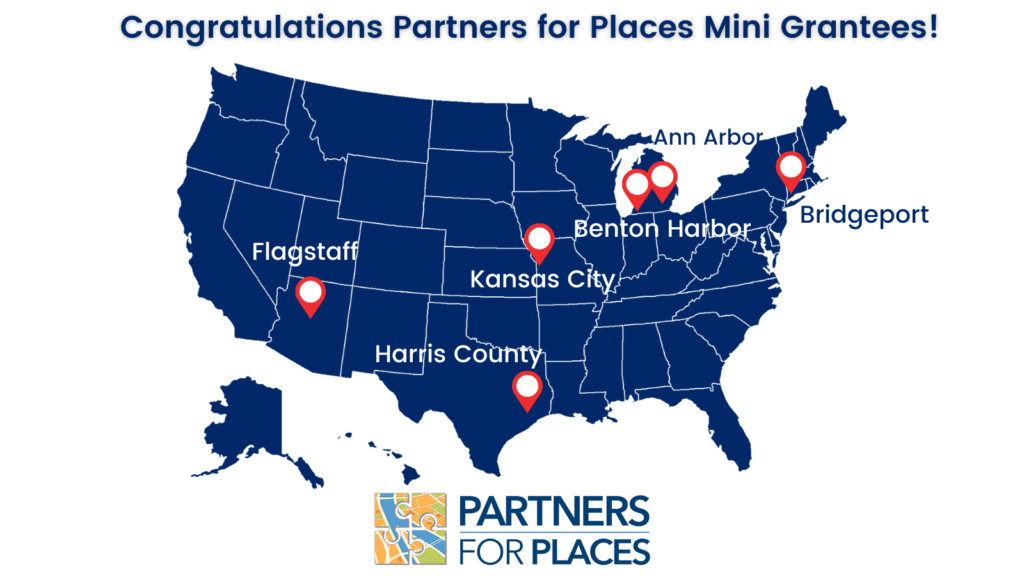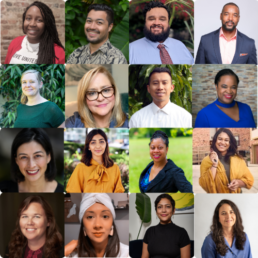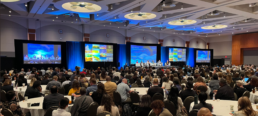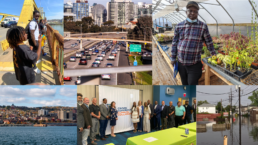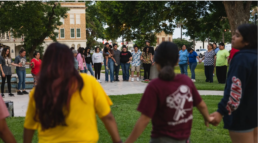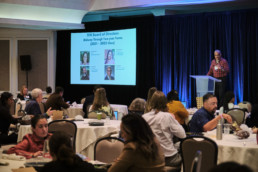We Asked Three Funders to 'Imagine a Day Without Water'
Today, The Funders Network joins elected officials, water utilities, community leaders, educators, and businesses from across the country as part of the seventh annual Imagine a Day Without Water, a nationwide day of education and advocacy about the value of water. Led by the US Water Alliance’s Value of Water Campaign, over a thousand organizations across the country will join Imagine a Day Without Water on October 20, 2022, to raise awareness about the role of water infrastructure in our lives and the importance of investment. The focus of this year’s event is to invite people to take the #OneWaterPledge and learn more about where our water comes from and where our wastewater goes. (Learn more at imagineadaywithoutwater.org and follow the conversation on social media at #ValueWater.)
To honor this day, TFN asked three members of our Urban Water Funders Steering Committee to "imagine a day without water"...
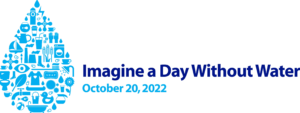
Growing up in Chicago, it was hard for me to understand why anyone in the Windy City lacked access to safe, affordable tap water.
After all, we lived on the shores of Lake Michigan — the fifth largest lake on the planet.
Later, I became more aware of water crises in communities around the country. In the Great Lakes region, where I still live, tens of thousands of people cannot afford to pay their water bills. Some people deal with boil water orders because of contaminants in their drinking water.
This paradox of people who reside in a water-abundant region being unable to afford their water has serious ramifications. Scientists recently discovered that a lack of access to safe, affordable water during the COVID-19 pandemic increased the risk of health problems. One reason: Proper hand washing is critical to preventing the spread of COVID-19 and other viruses.
Ensuring that tap water is safe is only one part of the equation. We also must ensure that water is safe and available to all people, and affordable. In other words, we need water equity.
My employer, the Charles Stewart Mott Foundation, supports over 20 nongovernmental organizations working to address water equity issues in the Great Lakes region. Mott has a two-pronged goal for the work: ensure universal access to safe, affordable water while maintaining the financial health of water utilities.
Achieving water equity is a daunting challenge, but failure is not an option. Access to safe, affordable tap water is essential to public health and personal dignity. No one should be forced to cope with life's daily challenges without safe water flowing from the tap at home. Click on these resources below to learn more about water affordability.
Water Affordability: A Growing Challenge;
Affordable water in the US: A burgeoning crisis;
Drowning In Expensive Water Bills? The Low-Income Household Water Assistance Program Can Help
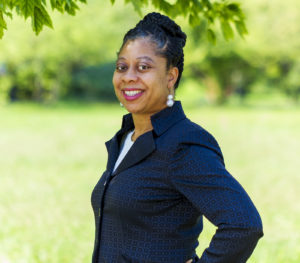
Melanie Moore
Associate Program Officer, Environment | Charles Stewart Mott Foundation
TFN Urban Water Funders Steering Committee & 2022 PLACES Fellow
Hawaiʻi has always been an Island community defined by water.
Native Hawaiian ʻōlelo noʻeau (proverbs) often refer to the idea that water is life. It is said, ola i ka wai a ka ʻōpua — there is life in the water from the clouds.
From our rainforests and streams, fed by rainfall, to our aquifers, which support all who live here, what would these Islands be without fresh water?
At Hawaiʻi Community Foundation, we know that a day without water would mean our houseless communities go without reprieve from rising temperatures. It would mean our Hawaiian kūpuna (elders), who are statistically more likely to be afflicted with diabetes, could not access life-sustaining dialysis. It would mean our mothers who rely on the already scarce supply of formula could not feed their babies.
In Hawaiʻi, water is the essence, the foundation, of wealth. Before trade and tourism, we had water. Water is culture. Water is sustenance. As funders, and catalysts for change, water flows through every sector we touch.
Without it, we would become impoverished of our identity, our existence. There is no grant large enough to replace water, even for a day.
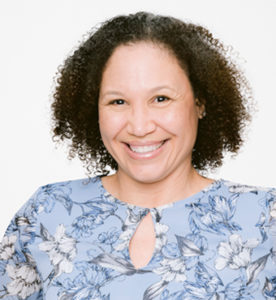 Dana Okano
Dana Okano
Program Director | Hawaiʻi Community Foundation
TFN Urban Water Funders Steering Committee
Sadly, “a day without water” is becoming all too common for Texans.
For many Texans, “a day without water” is not an imagined experience—it’s just another day.
Some communities have never had running water. For the rest of us, experiencing days without water has become the rule rather than the exception. The one-two punch of climate-driven weather extremes and population growth have strained the state’s water supply and aging drinking and wastewater infrastructure.
Texas is more likely to issue a boil water notice than any other state, disproportionately affecting low-income, rural, and communities of color. Texans are also increasingly more likely to lose access to water following natural disasters. During Winter Storm Uri in 2021, 15 million Texans lost access to water. Just five years ago, Hurricane Harvey rendered drinking water unusable from Corpus Christi to Houston and Beaumont.
With increasing urgency, however, communities are responding by building resilience and protecting Texas’s water.
The Cynthia and George Mitchell Foundation envisions a One Water future as a pathway toward water security and sustainability. And our grantees have been doing prodigious work to advance this vision, from coordinating responses to disasters to facilitating One Water adoption across the state.
For example, the National Wildlife Federation (NWF), Texas Living Waters Project, and Bayou City Waterkeeper have pursued freshwater protection through forward-looking policy and planning efforts. Recently, NWF published a report highlighting water loss due to aging infrastructure to help pinpoint areas for investment in upgrades.
West Street Recovery, founded in response to Hurricane Harvey, is working with Houston communities to organize and advocate for equitable water assistance and justice.
Communities Unlimited has been working to help small, rural, and often low-income communities by providing deep technical assistance in accessing state and federal funds for water.
While it’s a reality that many face every day, we’re confident that through the great work of these and other organizations, together, we can protect Texas’s water and equitably meet these increasing demands for water across the state.
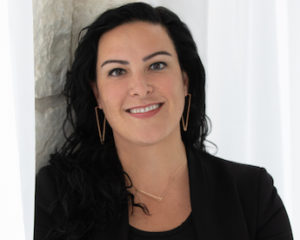 Dr. Emily R. Warren Armitano
Dr. Emily R. Warren Armitano
Director, Land Conservation and Water Programs | The Cynthia and George Mitchell Foundation
TFN Urban Water Funders Steering Committee
About Urban Water Funders
Urban Water Funders, a TFN working group, is a network of place-based and national funders addressing urban water issues in communities across the country. Funders learn together, build relationships and catalyze action.
Currently, funders are prioritizing a variety of solutions to urban water issues — including One Water approaches, natural and green infrastructure and climate resilient strategies — with a strong focus on water equity and vulnerable communities.
If you would like to subscribe to TFN’s Urban Water Funders working group in order to receive newsletters and other resources, click here.
Going PLACES | Reflections from Vermont: What can philanthropy do better?
BY Jennifer Pereira, PLACES Fellow
Arriving in Burlington, Vt., after a five-hour car ride from Rhode Island, I was struck by the beauty of the landscape: the sun shining on Lake Champlain, surrounded by mountains. I was in Vermont for the first of three site visits as one of sixteen PLACES Fellows. PLACES is designed for participants to use learning, coaching and reflections onsite to explore structural racism, community empowerment and grantmaking practices that have equity at their core. At first glance, Vermont — about 94% white and a population of about 624,000 people (a little over half the population of Rhode Island), spread out among a primarily rural context — did not seem the obvious choice to start this conversation. But wait…
Our first meeting was with the Vermont Community Foundation, a community foundation based in Burlington. A person new to the organization told us about the foundation’s development of a new impact area that will focus on equity, anti-racism and democracy as a result of its experience with COVID-19 response grantmaking.The speakers that followed — from the Vermont Land Trust and the Intervale Center — spoke about land, land ownership, access, and asking themselves the question “who benefits” from their work. Both speakers were candid about the need to grow and apply a strong racial equity focus on their role in land ownership — that fundamental inequity that underlies persistent, systemic injustices. The Land Trust engages in land return projects with Indigenous bands; there were three Abenaki nominees for the Vermont Land Trust board this year. The 4,000-acre Intervale Center is historically rich and significant land for the Abenaki, who lead land recognition ceremonies on the property. When we asked members of the organizations what philanthropy can do better to support these efforts, we received these response:““Look in the mirror and recognize the power dynamic.” “Fund organizations that are led by and represent the community being served.”
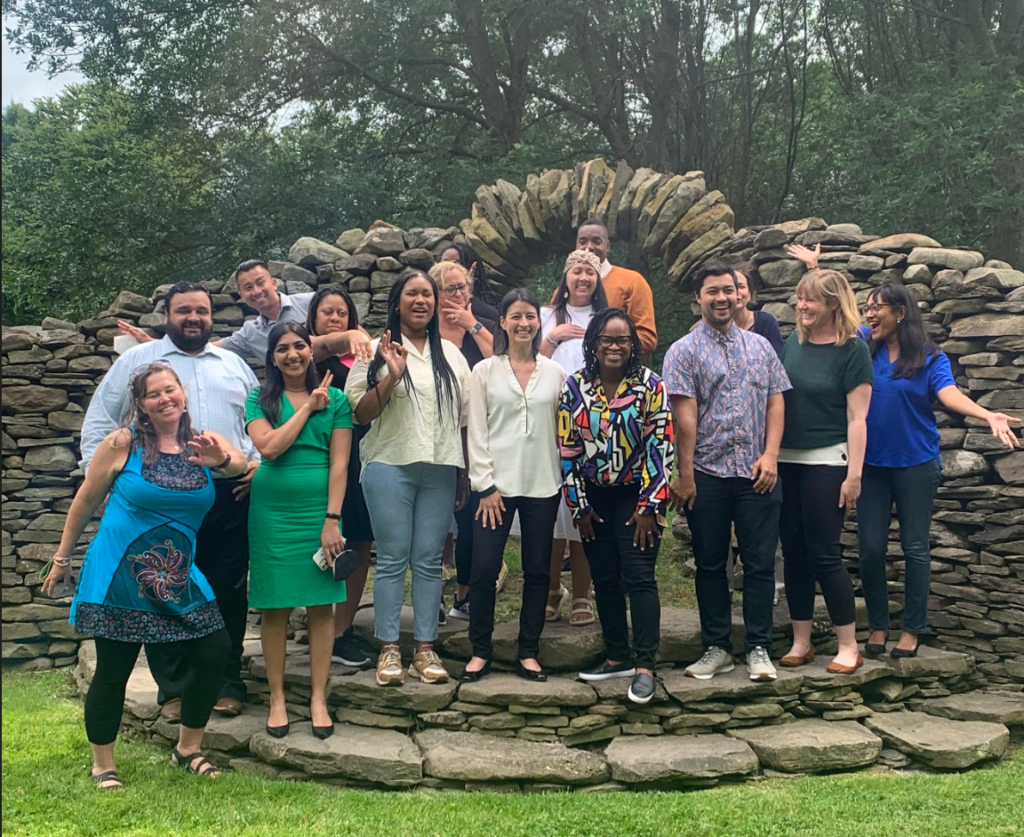
On our second day, we had a thought-provoking conversation focused on environmental justice with State Senator Kesha Ram Hinsdale of the Vermont General Assembly; Ginny McGinn, executive director off the Center for Whole Communities; and Kiah Morris, executive director of Rights & Democracy. These three impressive speakers talked about successes and models from their work,including the passage of the first environmental justice law in Vermont in 2022 and the creation of REJOICE (Rural Environmental Justice Opportunities Informed by Community Expertise) to engage people most impacted by environmental injustice in policy change. This and the Climate Council raised the importance of compensating people for their time and valuing community expertise. They also spoke about the challenges: Burlington sees huge racial disparities in outcomes for white people and communities of color, notably in homeownership. Only 21.1% of the Black population in Burlington owns their own home, far below the national numbers.
When asked, what can philanthropy do better?
- Unrestricted funds are a blessing
- Trust the people doing the work
- Show up, step back, and trust
- Support healing and self-care for frontline advocates
- Step up, not lean away, from funding racial and social justice
A conversation with City Councilor Ali Dieng, who cofounded the New American Advisory Council, and Brian Pine from the City of Burlington’s economic development office, focused on housing and included a discussion of the Community Land Trust model. This model provides a pathway to homeownership for historically marginalized communities, including the New American population.
The visits and conversations told us a different story about Vermont than is evident at a first glance and demonstrated the complexities of place. Of community. The people we met were inspiring — and exhausted. Over the course of about 56 hours in Vermont, multiple site visits and presentations, and provoking debriefs with my companions on this year-long Fellowship journey: fifteen remarkable individuals and our fearless and supportive guides, one recurring message kept playing out in these discussions and in my thoughts: What can philanthropy do better?
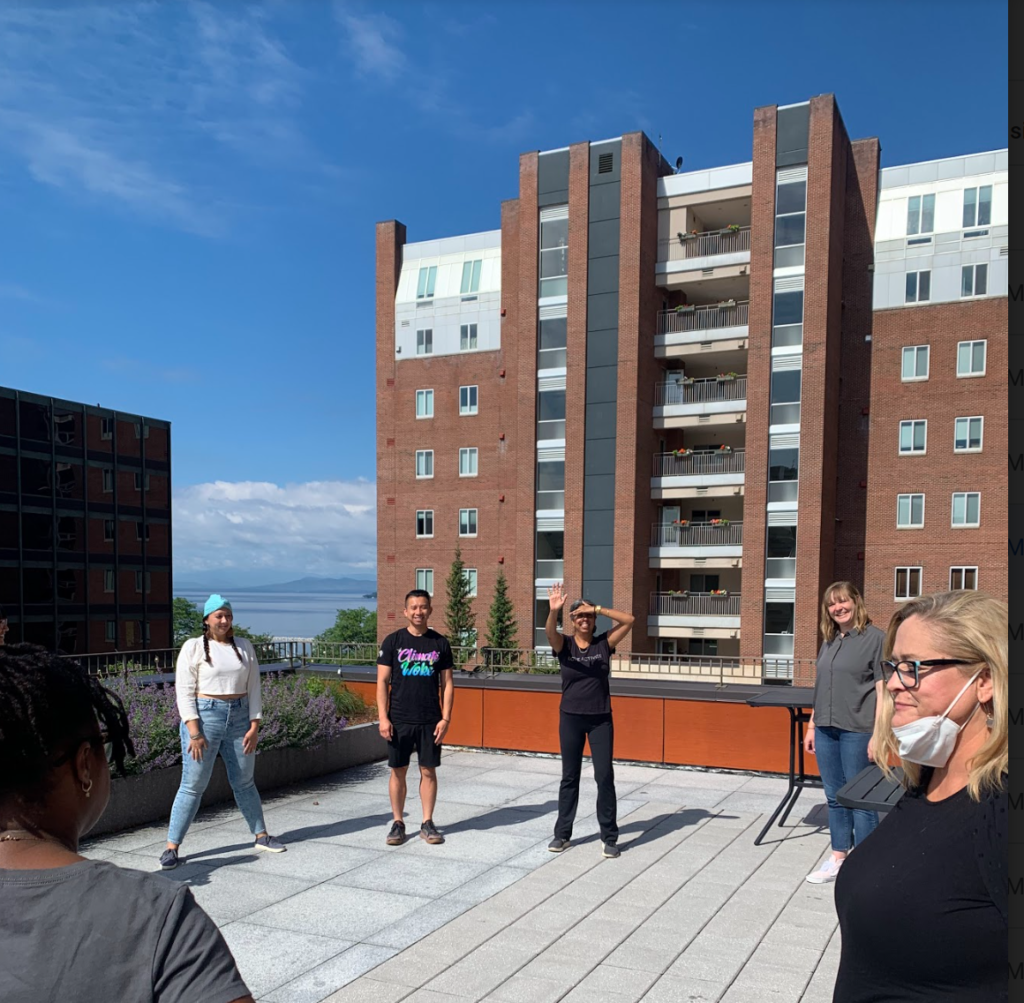
All of our site visits were unpacked and examined through conversations among the Fellows, facilitated by the gifted Bina Patel. What can philanthropy do better? We need to ask the question, how does the community envision how they can thrive? We can ask this question, and listen and heed the response. We need to do better, “because we bear witness..
This first PLACES site visit gave me the opportunity to challenge assumptions, learn new perspectives, and reflect on what I, in my role in philanthropy, can do better. In Vermont, 94% of the population is white, and we learned that 75% of traffic stops are of Black men; In Rhode Island, the racial gap in homeownership is wider than the national average; Black and Hispanic children in Rhode Island are more likely than White children to live in neighborhoods that lack the resources needed for them to grow up healthy and successful. These systemic inequities are real, deeply rooted, and are the cause of unspeakable trauma and harm to people — the people we met in Vermontnd the people we know in our communities. From re-orienting the conversation so that it is community-led and driven, to showing up in the difficult conversations, I’ll carry this experience with me and focus on action.
What will I do better?
About the Author
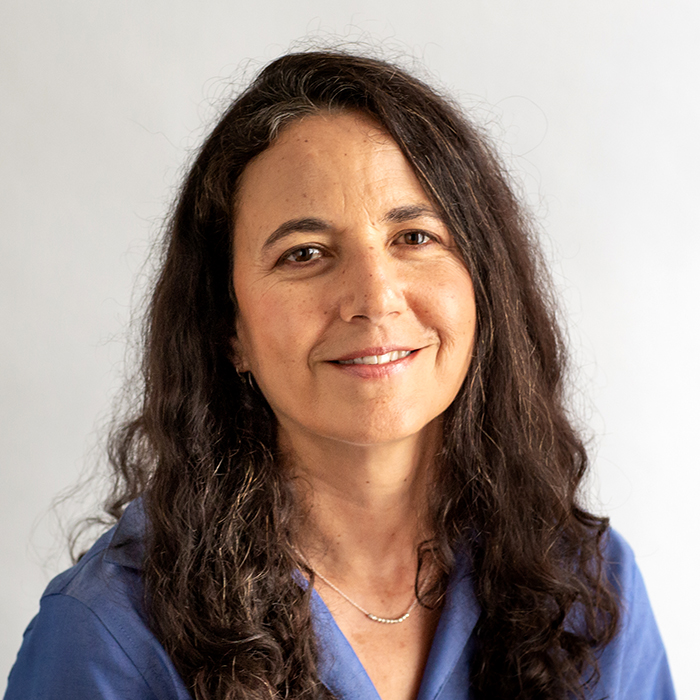
Jennifer Pereira is Vice President of Grants & Community Investments at the Rhode Island Foundation. She is also a member of TFN's 2022 PLACES Fellowship cohort.
Congratulations to our Partners for Places Mini Grantees!
BY TFN STAFF
The Funders Network, in partnership with the Urban Sustainability Directors Network, is excited to announce the latest round of Partners for Places Mini Grants. These grants are intended to help local governments, place-based funders and frontline communities build relationships, align project ideas, and center racial equity in water, sustainability and climate action work.
The Partners for Places Mini Grants are designed to spark new relationships or deepen existing connections that will help communities develop a successful Partners for Places project application in the future.
Partners for Places is a matching grant program that improves U.S. and Canadian communities by building partnerships between local government leaders, community groups and place-based funders. National funders invest in local projects developed through these partnerships to advance efforts to create communities that are sustainable, prosperous and just. These sustainability efforts take place from coast to coast, in communities both large and small, and focus largely on empowering and engaging low-income neighborhoods.
MEET THE NEW GRANTEES!
These six communities are the latest recipients of the Partners for Places Mini Grants:
Ann Arbor, Mich.:
Amount: $15,200
Project title: Developing Legal Services Models for Community Stabilization
Project description: “Partners will develop a shared model of legal counseling for income-qualified homeowners to stabilize families by reducing the risks of displacement and asset loss while maintaining weatherization investments. Outreach strategies that build trust and participation will be developed with the frontline community and test participants.”
Frontline community groups: Legal Services of South Central Michigan, Community Action Network’s Bryant Community Center, and Housing Bureau for Seniors, Michigan Medicine
Funder partner: Ann Arbor Area Community Foundation
Benton Harbor, Mich.:
Amount: $15,000
Project title: Sustainability Office in Community Impacted by Emergency Management
Project description: “To facilitate stakeholder engagement and strategic planning for creation of a sustainability office that will provide local and regional leadership on GSI implementation, climate resilience, restorative community partnerships, and Justice40 execution in an environmental justice community.”
Frontline community groups: Project NEED Foundation and Michigan Sustainable Business Forum
Funder partner: Americana Foundation
Bridgeport, Conn.:
Amount: $20,000
Project title: Changeport: Accelerating Environmental Justice in Bridgeport & Beyond
Project description: “Seaside Sounds Club, with its multitude of collaborators, will innovate community engagement and bi-directional educational outreach in Bridgeport, Conn., and beyond, to powerbuild and prepare frontline communities to apply for newly available federal and state funds for environmental justice and climate resilience projects.”
Frontline community group: Seaside Sounds Club
Funder partners: Emily Hall Tremaine Foundation and Sustainable CT: Community Match Fund
Flagstaff, Ariz.:
Amount: $20,000
Project title: Mapping Flagstaff’s Green Spaces and Schoolyards
Project description: “Project partners will map and assess community infrastructure, access and needs in relation to green spaces/schoolyards. In response to Flagstaff’s Climate Action and Neutrality plans, this project will advance policies that promote racial and socioeconomic equity for the most vulnerable segments of our community to ensure climate justice for all.”
Frontline community groups: Ita Hopi Lavayi, Flagstaff Unified School District, and Terra BIRDS
Funder partner: Arizona Community Foundation of Flagstaff
Harris County, Texas:
Amount: $20,000
Project title: Equitable Climate Justice Partnerships in Harris County
Project description: “First, funding will go towards a local expert to help the three partners build a foundation of equitable collaboration. Second, funding will go towards the co-production of an equity framework and co-hosting preliminary community conversations for the soon-to-be developed Harris County Climate Justice Action Plan.”
Frontline community groups: The Coalition for Environment, Equity, and Resilience (CEER)
Funder partner: Jacob and Terese Hershey Foundation
Kansas City, Mo.:
Amount: $20,000
Project title: From Coal to Solar in KC’s Historic Northeast
Project description: “In response to Kansas City’s Climate Protection and Resiliency Plan, the purpose of this grant is to form a coalition to expand solar availability to low-income residents who have been most impacted by Kansas City’s only operating coal-fired power plant.”
Frontline community group: Jerusalem Farm
Funder partner: Marion and Henry Bloch Family Foundation
ABOUT PARTNERS FOR PLACES
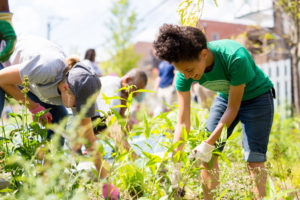
To date, Partners for Places has awarded more than $9 million across the U.S. and Canada in this successful matching grant program, leading to more than $19 million in investments.
The matching grant program brings national funder investors together with place-based funders to support equitable and sustainable climate action and green stormwater infrastructure projects. The program is currently supported by six investor foundations: The Allen H. and Selma W. Berkman Charitable Trust, The JPB Foundation, The Kendeda Fund, The Kresge Foundation, the New York Community Trust, and the Pisces Foundation.
Read about the latest round of Partners for Places matching grant recipients here.
To learn about the previous round of Partners for Places Mini Grants, visit here. (All grant announcements can be found on the Partners for Places webpage.)
For questions about the Partners for Places Mini Grants or matching grants program, please reach out to Ashley Quintana.
PARTNERS FOR PLACES FAQ’S
→ Where is Partners for Places making an impact?
Read previous grant announcements and explore the Partners for Places Grantee Map here.
→ Where can I learn about completed Partners for Places projects?
Visit the Partners for Places Idea Bank to explore what grantees are doing, learning and sharing.
For more information about Partners for Places, please reach out to Ashley Quintana, ashley@fundersnetwork.org.
Are you the Future of Philanthropy? Become a TFN 2023 PLACES Fellow - Applications Now Open!
BY TFN STAFF
We’re thrilled to announce that applications for TFN's 2023 PLACES Fellowship are now open!
PLACES — which stands for Professionals Learning About Community, Equity and Sustainability — is a year-long learning journey designed to help grantmakers embed the values and practices of environmental, economic and racial justice into their work.
We encourage you to apply for the PLACES Fellowship if you’re looking to:
- Expand your understanding of systemic racial, social and economic inequities and their impacts on policy, culture, communities and climate.
- Acquire the tools and resources to embed the values of equity and justice in your work as a grantmaker.
- Explore and challenge your own biases and blind spots, regardless of your background, about who you are and how you create change.
- Forge deep connections with other leaders in philanthropy who are deeply committed to turning ideals into outcomes.
- Invest in your personal and professional leadership growth.
The deadline to apply is Nov. 18, 2022
→ View application and apply today!
About the 2023 PLACES Fellowship
The 2023 PLACES Fellowship will be an in-person experience, although we recognize that the ongoing coronavirus pandemic may require us to be flexible. (Applicants will be asked to complete a short COVID-19 Comfort and Safety Survey as part of their application.)
Key 2023 Fellowship Dates*
March 20-22: TFN Annual Conference, New Orleans
April 19-21: Kickoff Site Visit
June 21-23: Site Visit #2
Sept. 20-22: Site Visit #3
Nov. 15-17: Site Visit #4
*Dates are subject to change. Locations TBD.
Fellowship Fees
For accepted participants, the following fees will apply:
TFN Members: $750
Non-members: $1,250
Fees help support the programmatic and operational costs associated with the fellowship, including but not limited to, speaker honoraria, facilitator fees and group transportation. Fellows will be responsible for travel costs and hotel accommodations for site visits. (Limited travel sponsorships will be available to offset travel costs and are subject to availability.)
COVID Contingencies
Given the uncertainties of the ongoing coronavirus pandemic, TFN remains committed to prioritizing the safety of our fellows and the communities they serve.
We will be closely monitoring recommendations and mandates from local health officials as well as the Centers for Disease Control and Prevention as we plan for the 2023 PLACES Fellowship.
Please review TFN’s Covid Health & Safety Protocols for more information about our current policies.
About PLACES

TFN’s mission is to leverage philanthropy’s unique potential to help create communities and regions that are sustainable, prosperous and justice.
A key element to this organizational commitment: creating generations of courageous philanthropic leaders who are engaged, emboldened and equipped to bring about meaningful change.
Over the past decade, PLACES has welcomed 180 leaders in philanthropy committed to deepening their understanding of environmental, economic and racial justice. Translating those skills and knowledge into grantmaking and community engagement practices has taken on increased urgency as we navigate multiple, intersecting challenges: an escalating climate crisis, an ongoing pandemic and a widening wealth gap, all of which are causing disproportionate harm to communities of color.
Recent cohorts have addressed issues impacting disenfranchised communities, including structural racism, gender justice, health equity, environmental sustainability, economic development and community engagement — asking difficult questions and exploring uncomfortable truths along the way.
→ Meet the 2022 PLACES Fellows (pictured above on their site visit to Vermont.)
Grow Your Network!
By becoming a PLACES Fellow, you’ll also have opportunities to connect and collaborate with peers in the sector through the PLACES Alumni Network.
This amazing network is comprised of alums from all corners of the United States and Canada, representing national, regional, family, corporate, and community foundations as well as philanthropy serving organizations and other funding institutions.
PLACES X: Stories of Impact

For the 10th anniversary of TFN’s PLACES Fellowship, we asked PLACES alumni to share what inspires, motivates and challenges them in their efforts to embed the values of racial, social and economic equity into their work.
They shared their experiences through PLACES X: Stories of Impact, which includes essays and videos.
→ Explore the full multimedia project here.
Going PLACES Blogs

After each PLACES site visit, we ask the fellows to reflect on their experiences in our blog series Going PLACES. Check out some highlights from our PLACES alumni.
→ Going PLACES - Trading Palm Fronds for Maple Leaves: What Two Demographically Distinct States can Learn from Each Other | By Xan Avendaño, 2022 PLACES Fellow and Program Officer at The Harry and Jeanette Weinberg Foundation.
→ Going PLACES: What the Newark Rebellion can teach us about Philanthropy | By Grace Chung, Senior Community Development Officer, LISC New York City and 2019 PLACES Fellow.
→ Going PLACES: Becoming A Change Agent | By Andrea Hulighan, Director, Strategic Initiatives, The Winston-Salem Foundation, and 2018 PLACES Fellow.
Making the Moment Count: Reflections on Philanthropy’s Role in Equitable Implementation of Historic Water Investments
BY KERRY HASTINGS, The Funders Network
I had the wonderful opportunity this fall of attending the US Water Alliance’s One Water Summit in Milwaukee, Wisc., joined by five of our Urban Water Funders Steering Committee members: Alex Paxton of the Water Foundation; Dana Okano of the Hawaii Community Foundation; Yeou-Rong Jih of the Kresge Foundation; Emily Warren of the Mitchell Foundation, and Maggie Rwakazina of Spring Point Partners. It was a rich time of deepening relationships, learning together, and preparing for the years ahead of historic public investment in water infrastructure.
What stood out initially was the cross-sectoral nature of the conference. To be in a room mixed with utility leaders, other municipal leadership, community advocates, NGOs and funders led to rich and well-rounded discussion. In a moment where billions of dollars will be flowing through public agencies, community voice must be centered, and the conference allowed for fruitful discussion between the various stakeholders that will be involved in making this moment count.
While the amount of federal dollars is tremendous, there are gaps and blind spots that public spending can’t or won’t address. Here are my reflections from the conference on some of the most important roles for philanthropy to play in supporting equitable implementation:
- Frontline communities must guide the way. Federal water investments will certainly get to communities who are already well-resourced. The challenge is getting them to communities who need it most yet are least equipped to apply (such as small and/or rural communities) or those whose neighborhoods are less prioritized (such as low-wealth neighborhoods within major cities). Ensuring that community-led organizations have the resources they need to understand and advocate within the system ensures that they will see projects come to their communities that bring benefit and not harm. They can shape project proposals, apply for funding, advocate for more equitable criteria to distribute the monies, and hold elected officials accountable. In addition, their involvement is critical to think through how to avoid unintended consequences that investments often bring to low-resourced communities, such as gentrification and displacement.
- Supporting collaboration and stakeholder alignment. This is not an either/or moment, it is a both/and one. Funders cannot invest in just one stakeholder or strategy while ignoring the others. There are several players that will be involved in ensuring equitable implementation: states and municipalities, utilities, organizers and advocates, funders, technical assistance providers and engineers. For the most effective outcomes, communities need a healthy ecosystem where stakeholders can communicate, align and build consensus when possible. Philanthropy can play a role in helping to build this table and paying particular attention to centering community voices and ensuring that lived experience within a community is as highly valued as technical and engineering experience. While not every stakeholder can or should be funded by philanthropy’s limited dollars, investing in bringing folks together will prove valuable.
- The workforce conundrum is front and center. The “silver tsunami” of the water workforce is not a new challenge but has been exacerbated by COVID-related retirements. On top of that, the influx of billions of dollars means that new staff are needed: to apply for the money, manage and distribute the money, build the projects and maintain the projects. New staff are needed everywhere — within states and cities, at utilities, engineering firms, and for community-led work — and yet the water sector was already struggling to recruit and maintain a skilled workforce. Funding organizations that are focused on workforce development in partnership with the water sector can be critical for equitable implementation, so that a diverse and trained workforce can reflect the community’s values in overseeing water infrastructure projects. This investment can happen through investing in NGOs that train workers, especially those who are disenfranchised such as formerly incarcerated people. It can also build leadership for existing water leaders or help build pipelines from community colleges into the water sector.
- Nudging Towards Nature-Based Solutions. When there is an influx of money that is expected to be used quickly, most humans would defer to what they are used to. In the water sector, that is grey infrastructure. The research show that multi-benefit, nature-based solutions such as green stormwater infrastructure (GSI) can provide ecological, economic and social benefits, yet states have previously allocated only 3% of their State Revolving Funds towards GSI. Funders can continue to support advocacy, technical assistance and other program support (such as TFN’s Partners for Places GSI grants) to continue to promote these important solutions to address flooding and provide healthy community spaces.
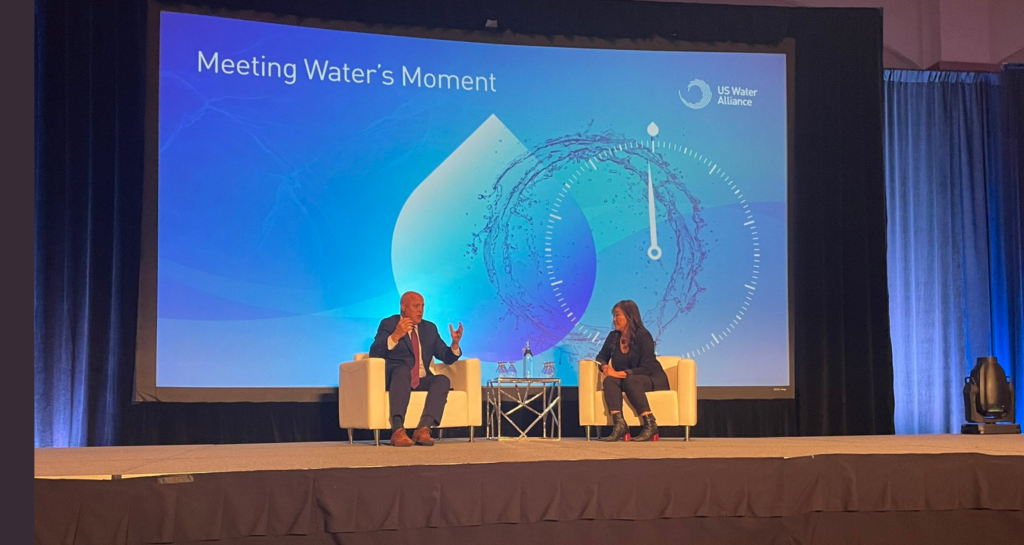
I look forward to hearing from all of you how these resonate with your work and investments, and what other strategies you have identified as the most strategic for your foundation.
Finally, I want to give a shout out to two of this year’s Water Prize winners that were honored at the summit. Receiving the Outstanding Public Sector Organization award was the City and County of Honolulu, whose amazing work you may have heard about at our 2022 UWF/GREEN Joint Convening earlier this year. UWF Steering Committee member Dana Okano of the Hawaii Community Foundation was a key part of this work. The Outstanding Nonprofit Organization award went to Healthy Community Services in New Orleans. Healthy Community Services is one of the frontline community groups collaborating on a project to create equitable green designs for NOLA neighborhoods, a project that has received a Partners for Places Mini Grant.
I look forward to learning together at next year’s One Water Summit in Tucson, Ariz.!
About the Author
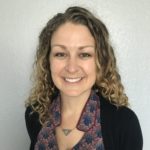 Kerry Hastings is TFN’s program lead for Urban Water Funders and a program manager for Smart Growth California, a TFN initiative.
Kerry Hastings is TFN’s program lead for Urban Water Funders and a program manager for Smart Growth California, a TFN initiative.
Featured photo credit at top: US Water Alliance/ @USWaterAlliance
Partners for Places: Eight U.S. Communities Receive nearly $1.3 million in Grants for Community-led Sustainability Projects
BY TFN STAFF
From helping neighbors install rain barrels in New Jersey to growing food at an urban agriculture site in Minnesota to planting native trees and community gardens on the Hawaiian island of Kaua‘i, the latest round of Partners for Places grants will help support efforts to create more equitable and resilient communities across the U.S.
In all, eight U.S. communities will receive nearly $1.3 million in Partners for Places matching grants to support sustainability efforts that focus largely on addressing the needs of historically marginalized communities that are disproportionately impacted by an escalating climate crisis and other environmental injustices.
By bringing together local governments, place-based funders and frontline community groups, these projects are also helping build relationships that will fuel even more action and collaboration at the grassroots level — fostering authentic engagement and input from populations and places that often bear the brunt of climate-fueled inequities but are often left out of decision-making processes.
The eight communities receiving this latest round of Partners for Places grants are: Baltimore County, Md.; Cook County, Ill.; Duluth, Minn.; Hackensack, N.J.; Kaua‘i County, Hawai‘i; Multnomah County, Ore.; Pittsburgh, Penn.; and San Diego County, Calif.
Meet the New Grantees!
So how will they use Partners for Places grants?
In San Diego County — where local leaders have proposed an ambitious plan to move the region toward zero-carbon emissions — the Partners for Places grant will be used to support targeted engagement of refugee, asylee and immigrant communities as part of the County’s larger regional engagement strategy, ensuring that implementation plans are equitable, prioritize community needs and offer solutions to climate change that are informed and shaped by those most impacted.
Illinois’ Cook County will use the Partners for Places funding to support a broader effort to bring together communities across racial and economic divides to share ideas, secure resources and drive large-scale projects to achieve equity and sustainability goals and reduce greenhouse gas emissions. The project also includes efforts to increase access to electric vehicle charging stations and increase the number of commercial properties, small businesses and households that embrace solar power and other green technologies.
Fostering authentic and inclusive community engagement, especially in areas that have been racially and economically marginalized, is a critical goal fueling many Partners for Places projects.
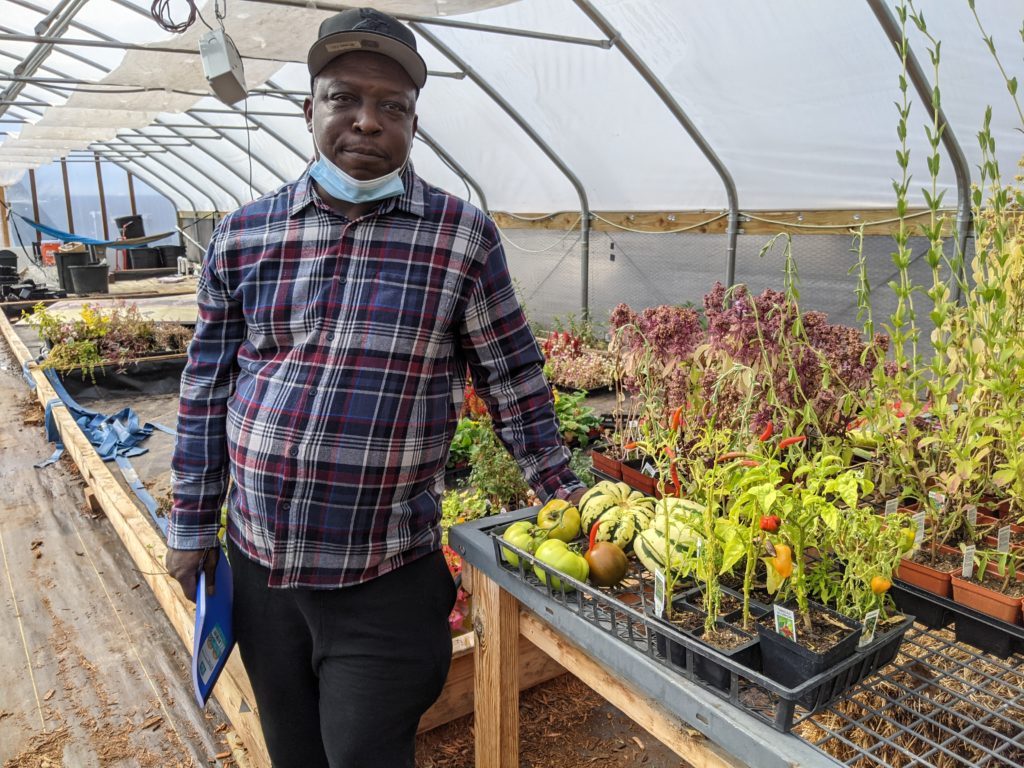
In Multnomah County, home to the City of Portland, this latest round of funding will build on an earlier Partners for Places grant, addressing the need for more coordinated collaboration between municipal leaders and residents to tackle the climate crisis, including developing a steering committee composed of representatives from local government and frontline communities to guide the planning process.
Partners for Places funding will help the community of Duluth build climate resilience and address health disparities in a low-income neighborhood. The project includes supporting “neighborhood champions” that can advance the city’s climate action plan and build greater neighborhood involvement in city-led policy and project discussions. The project also includes plans to use part of an urban agricultural site as a place for learning and social connection that will increase access to healthy foods. Another goal: helping residents identify and plan their own neighborhood-based projects.
Four of the communities selected for the latest round Partners for Places will receive dedicated funding specifically for green stormwater infrastructure projects.
In Baltimore County, where Black and other communities of color are disproportionately impacted by flooding and pollution, the grant will be used to develop and deliver public outreach and education to implement recently passed environmental enforcement legislation, ensuring water quality violations are corrected in a timely manner, government is responsive and equitable, and waterways are cleaner.
In Pittsburgh, project partners hope to build a foundation for community leadership as significant riverfront planning efforts get underway in the city’s West End. Their goals include engaging young leaders and other stakeholders to outline community needs and lead a holistic, coordinated planning process that will bring people together through activities such as on-the-water tours, community meetings and workshops.
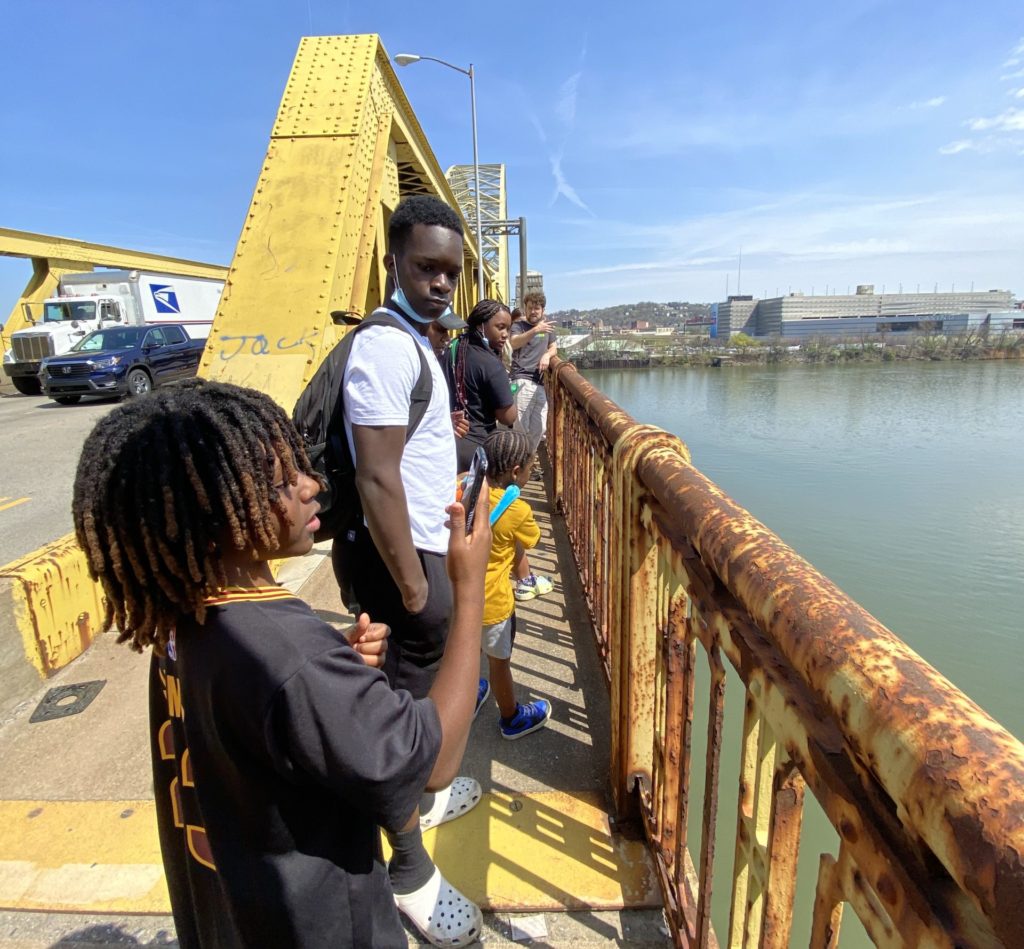
In Kaua‘i County, project partners will use the grant to support the installation of native trees and community gardens in Līhuʻe, the county seat, and create a partnership between county agencies, impacted community members and artists. The project includes community dinners to deepen connections and a collaborative process to identify additional green infrastructure projects. Local Kaua‘i artists will also create public murals near the proposed community gardens, designed to educate neighbors about local water issues and the benefits of green infrastructure, attract residents to use the connecting multimodal pathways, and beautify the downtown corridor.
In Hackensack, where extensive stormwater flooding coupled with a combined sewer system poses environmental and health risks particularly to Latinx, Black and other communities of color, the project seeks to build on flood-mitigation efforts by installing green infrastructure on public and private lands. The project also seeks to directly engage people from communities most impacted by flooding, involving them in green infrastructure planning and installation such as learning how to create rain gardens and install rain barrels that decrease stormwater run-off and help address flooding.
Partners for Places, led by The Funders Network (TFN) in partnership with the Urban Sustainability Directors Network (USDN), will provide $652,909 in funding to these eight communities through the grant program. With contributions from local matching funders, a total of $642,909 will be committed to fund sustainability projects in these selected communities. This grant cycle includes $345,000 — plus the local matching funds — awarded to the green stormwater infrastructure projects in Baltimore, Kuau’i, Hackensack and Pittsburgh. TFN and USDN have partnered with the Green Infrastructure Leadership Exchange, a practitioner network that supports communities seeking to grow green stormwater infrastructure programs, to support outreach efforts.
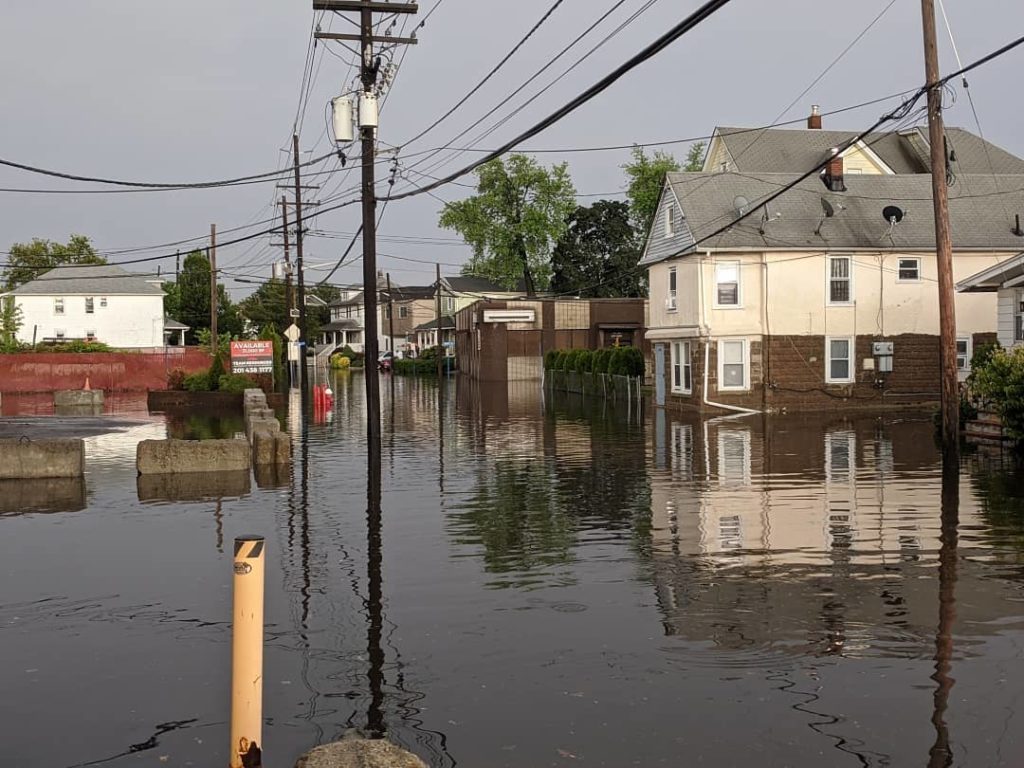
To date, Partners for Places has awarded more than $9 million across North America in this successful matching grant program, leading to more $19 million in investments.
The matching grant program brings national funder investors together with place-based funders to support equitable sustainable climate action and green stormwater infrastructure projects. The program is currently supported by The JPB Foundation, The Kendeda Fund, The Kresge Foundation, New York Community Trust, The Allen H. and Selma W. Berkman Charitable Trust, and the Pisces Foundation.
Partners for Places will open a new round of funding for the matching grants program in winter 2022. (Applications for Partners for Places Mini Grants will be available later this summer.)
Grants at a Glance
The latest Partners for Places grant recipients, project descriptions, matching funders and frontline community groups are:
- Baltimore County, Md. ($35,000): To build a movement of support for effective, equitable implementation of state-wide solutions addressing environmental response to climate change. Frontline community groups: Waterkeepers Chesapeake, Gunpowder Riverkeeper, and Blue Water Baltimore. Matching funder: Abell Foundation ($35,000).
- Cook County, Ill. ($97,909): To support building additional partners in Cross-Community Climate Collaboration (C4), implement structures for communication and collaboration within and across communities, and implement specific equitable climate projects. Frontline community group: Urban Efficiency Group. Matching funder: Oak Park River Forest Community Foundation ($97,909).
- Duluth, Minn. ($75,000): To build climate resilience and address health disparities in a low-income neighborhood through creative placemaking and collaborative partnership development. Frontline community group: Matching funder: Duluth Superior Area Community Foundation ($75,000).
- Hackensack, N.J. ($75,000): To enhance existing combined sewer separation plans with community-designed green infrastructure to mitigate stormwater flooding in low-income neighborhoods, addressing environmental justice issues. Frontline community group: Greater Bergen Community Action. Matching funder: Northern New Jersey Community Foundation ($75,000).
- Kaua‘i County, Hawai‘i ($85,000): To support the installation of native street trees and community gardens in Līhuʻe and create a plan/partnership framework for future green infrastructure. Frontline community groups: Better Block Hawaiʻi and Rice Street Business Association. Matching funder: Anonymous ($85,000).
- Multnomah County, Ore. ($50,000): To develop a frontline community-centered vision of climate justice that will serve as the foundation for a Multnomah County government and community climate justice plan. Frontline community group: Coalition of Communities of Color (CCC). Matching funder: Meyer Memorial Trust ($50,000).
- Pittsburgh, Penn. ($150,000): To build a foundation for community leadership as significant riverfront planning efforts get underway in Pittsburgh’s West End. Frontline community groups:O.P.E. for Tomorrow Inc., West End Community Group, and Riverlife. Matching funder: Heinz Endowments ($150,000).
- San Diego County, Calif. ($85,000): To develop an equitable, inclusive community engagement process that supports the engagement of impacted refugee, asylee and immigrant communities in the implementation of San Diego County’s Regional Decarbonization Framework. Frontline community group: Confirmation pending. Matching funder: The San Diego Foundation ($75,000).
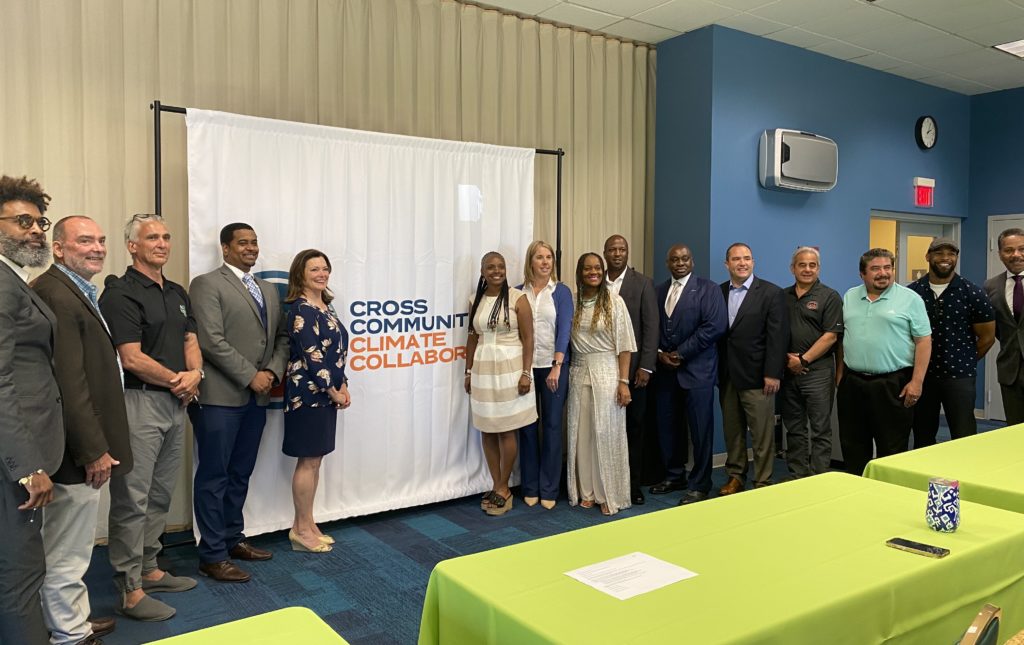
About Partners for Places
A joint project of The Funders Network and the Urban Sustainability Directors Network, Partners for Places is a successful matching grant program that improves U.S. and Canadian communities by building partnerships between local government sustainability leaders, place-based funders and frontline community groups. National funders invest in local projects developed through these partnerships to advance efforts to create communities that are sustainable, prosperous and just. Through these investments, Partners for Places fosters long-term relationships that make our communities more sustainable, prosperous and equitable. For more information on Partners for Places, visit fundersnetwork.org/partners-for-places/
About The Funders Network
The Funders Network (TFN) is a mission-driven network of grantmakers across North America that seeks to create impact at the intersection of environment, economy and equity. TFN works to inspire, strengthen and expand funding and philanthropic leadership that yields sustainable, prosperous and just regions and communities.
About The Urban Sustainability Directors Network
The Urban Sustainability Directors Network (USDN) a network of local government professionals across the United States and Canada dedicated to create equitable, resilient, and sustainable communities by advancing the field of local government sustainability and equipping practitioners to be catalysts of transformative change.
We Have so Much Work to Do: TFN's Pat Smith statement on Uvalde tragedy, plus advocacy resources for funders
BY PAT SMITH, TFN PRESIDENT & CEO
Last week in Uvalde, Texas, an 18-year-old armed with an AR-15 rifle and high-capacity magazines with hundreds of rounds of ammunition walked into a school and murdered 19 fourth graders and two teachers.
We’re still learning more about how the tragedy in Uvalde unfolded. But we know that solutions need to go deeper than hearts-and-prayer tweets or political posturing.
We must look past the headlines and social media noise and ask ourselves: What is philanthropy going to do about this?
• There are more guns than people in the United States. A 2018 report estimated that there are 393.3 million civilian-owned firearms in the United States, enough guns for every single adult and child to own one — and still have 60 million guns spare.
• So far this year, there have been 200 mass shootings in the U.S., an average of more than one a day. The violence in Uvalde came just 10 days after the racist rampage in Buffalo at a neighborhood grocery store and nine days after the shooting at the Irvine Taiwanese Presbyterian Church in southern California. Since last week’s shooting in Texas, there have been at least 11 other mass shootings in the U.S.
• The AR 15-style rifle, dubbed “modern sporting rifles” by the gun industry and which the shooters used in Uvalde and Buffalo to slaughter more than 30 people, is now the most popular rifle in the country.
• More than 311,000 students have experienced gun violence at school since Columbine. In 2020, firearms became the leading cause of death among children and teens nationally. Tragically, there are children dying every day in rural, suburban and urban communities from incidents of gun violence that rarely make the national news.
• And communities of color are disproportionally impacted by gun violence. A 2020 report from the John Hopkins Center for Gun Violence Solutions noted that Blacks are more than 12 times more likely to be victims of gun homicides than white people. Native Americans/Alaska Natives are nearly four times as likely than their white counterparts. People of Hispanic or Latin American descent are twice as likely to die than non-Hispanic/Latino whites.
Let all this sink in for just a moment.
In the coming weeks, our nation’s gun laws will be debated once again. It’s my deep hope that we support those working to enact policy changes at the local, state and federal level. We as a sector are sometimes misinformed and a bit skittish about funding campaigns calling for legislative action.
Foundations have the power to help support research and advocacy campaigns that lobby for gun safety legislation, including banning semi-automatic rifles like the AR-15 and high-capacity magazines, weapons of choice for mass murders. Congress found the will to do so for ten years, and “the body of research now increasingly suggests the 1994 law was effective in reducing mass-shooting deaths.”
Our Bolder Advocacy colleagues note that “foundation support for nonprofits that engage in advocacy, including lobbying and election-related activities, isn’t just legal — it’s important, powerful, and fundamental to democracy.”
In 2021, the gun industry set new lobbying spending record, spending $15.8 million on lobbying compared to $2.9 million in lobbying from gun control groups. That is more than five times as much. In the first quarter of 2022, these groups have already spent $2 million and gun control groups just $609,000.
Fund for a Safer Future, an effort supported by TFN members the Kendeda Fund and Annie E. Casey Foundation, among others, pools resources to invest in targeted, practical, strategies to reduce gun injuries and deaths.
The organization will host funders-only briefing on Thursday, June 2 at 2 p.m. ET. The briefing is open to all members of the philanthropic community who are interested in learning more about solutions to the growing public health crisis of gun violence and its devastating impacts on American life.
For more information about efforts to stem the tide of guns in America, here are policy agendas and other resources from Everytown for Gun Safety, which works with local, federal, and state governments to enact and implement policies that reduce gun violence; Moms Demand Action, which came about in the aftermath of the shooting at Sandy Hook Elementary in 2012 and is part of Everytown for Gun Safety; and March For Our Lives, created by young survivors of the 2018 school shooting in Parkland, Fla.
TFN’s staff team, all of us women, includes many mothers of young children. They are having yet another series of difficult conversations with their kids about what to do if a “bad guy” comes into their school. When checking in with these TFN moms last week, I was so dismayed to realize how routine mass shooter drills are for this generation of little kids, some barely toddlers, who are coming of age in the 10 years since Sandy Hook.
Our children deserve better from this world. Better from us.
We have so much work to do.
How to Help
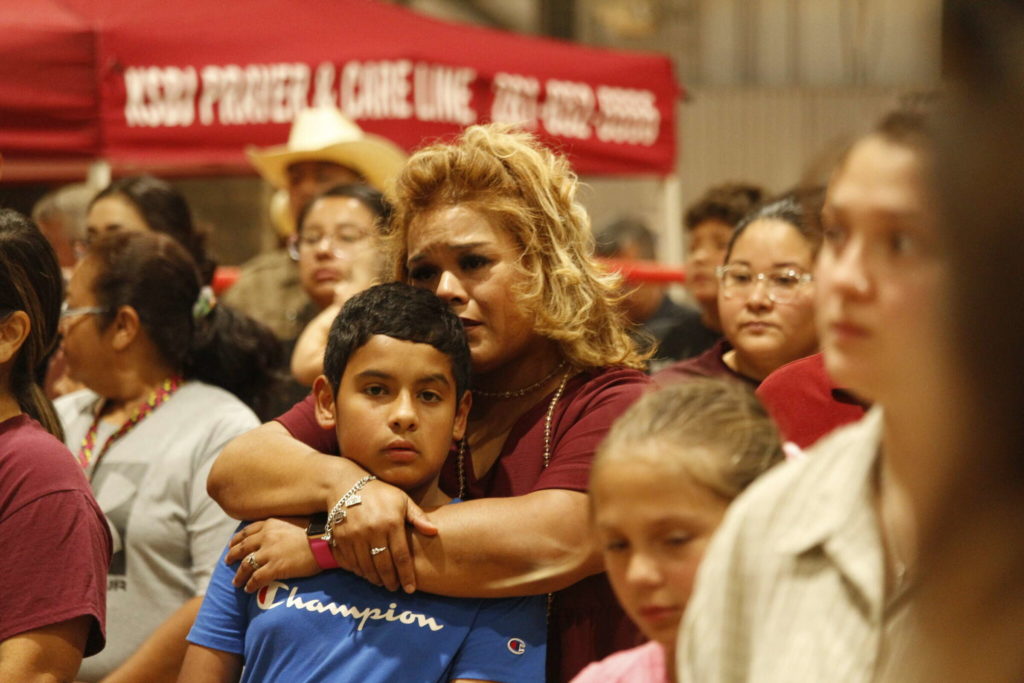
Uvalde Strong Survivors Fund will provide direct financial assistance to the survivors of the deceased and those directly affected by this tragedy. One hundred percent of the contributions donated to this fund will go directly to victims and survivors of this atrocity in partnership with National Compassion Fund. Donate here.
Uvalde Strong Fund is an emergency relief fund to support area nonprofits that will provide long-term assistance, including mental health services, in the Uvalde community. Donate here.
Additional Resources:
Lessons from Atlanta & Milwaukee | Improving Community Safety Through Public Health Strategies, The Annie E. Casey Foundation
Featured image at top: Jordan Vonderhaar/ Getty Images
'The Pain is in our DNA': TFN's statement on the Buffalo shooting - and how funders can help
BY PAT SMITH, TFN PRESIDENT & CEO
Margus Morrison was picking up snacks for a weekly movie date night with his wife.
Celestine Chaney had stopped in with her sister to buy strawberries for a shortcake recipe.
Andre Mackneill was there to get a surprise birthday cake for his young son.
And in a matter of seconds, they — and seven others — were gone. Ten lives cut short by a racist gunman who targeted their neighborhood grocery store in order to carry out an act of inexplicable violence.
Inexplicable. But not unfamiliar.
This Saturday, the Masten Park neighborhood of East Buffalo became the latest community terrorized by a radicalized white supremacist, a list that includes Charleston, El Paso and Christchurch.
I can’t look at the faces of those killed without seeing someone who looks like my brother, my grandmother, my nieces. Without seeing someone who looks like me.
It’s almost too much to process.
So as this sad and heavy week comes to an end, let’s start with the easiest part: How you can help the Buffalo community and survivors of this racist act of violence.
The Community Foundation for Greater Buffalo, a member of The Funders Network, has created The Buffalo Together Community Response Fund, in partnership with the United Way of Buffalo & Erie County and other philanthropic partners, to help address immediate community needs, long-term rebuilding and systemic issues in the aftermath of the the shooting.
Additionally, the Tops grocery chain and the National Compassion Fund has established the Buffalo 5/14 Survivors Fund to provide direct financial assistance to the survivors of the deceased and those directly affected by this tragedy. (You can find additional information on both of these efforts on the Buffalo Together webpage.)
Although this was the action of a lone gunman, this violence was not born in a vacuum. America’s history is steeped in racialized violence. And at just 18 years this gunman was already sufficiently immersed in the anti-Semitic, anti-immigrant and anti-Black language of replacement theory, which posits that malign forces are bent on replacing white people and stripping them of their innate power and privileges.
Once relegated to the dark fringes of the internet, this conspiracy theory has gone disturbingly mainstream with echoes of this madness coming from cable TV hosts and elected leaders.
As leaders in the philanthropic sector, I implore you to continue to invest in historically disempowered communities impacted by racism and support frontline, grassroot organizations through unrestricted funds and capacity-building resources.
Because racial violence can be inflicted not just by a lone gunman, but by systemic, racist policies and practices as well.
A recent New York Times story points out that Buffalo “is split into two vastly different worlds, the East and West Sides. About 85 percent of Black Buffalo residents live in East Buffalo, and researchers have mapped the effects of the split on nearly every aspect of life, including education, job opportunities, housing and even life expectancy, according to a 2018 report from the Partnership for the Public Good.”
Black people in Buffalo live an average of five fewer years than white residents. (The national gap between white and Black life spans is an average of 3.6 years.)
“The pain is in our DNA at this point,” 64-year-old Earlene Patterson told the Times. “It’s in my great-grandfather, my father. It’s in me.”
This is the very community this gunman was drawn to, driving three hours to inflict even more racial trauma on the Black people of East Buffalo.
Investigators and pundits will surely pore over the motives of this terrorist, whose name I will not type much less utter out loud.
Instead, I’ll share this image created by artist Jen White-Johnson and posted on social media by our friends at The California Endowment, with the all-too-frequent reminder that comes after an act of racial violence: Say Their Names.
When you have a quiet moment, please reflect on these 10 souls whose lives deserve to be remembered as more than just a tragic data point.
Roberta A. Drury, 32
Margus D. Morrison, 52
Andre Mackneil, 53
Aaron Salter, 55
Geraldine Talley, 62
Celestine Chaney, 65
Heyward Patterson, 67
Katherine Massey, 72
Pearl Young, 77
Ruth Whitfield, 86
Say their names. Tell their stories. And may their memories fuel not only tears and fury, but action. Because it’s only through action that we’ll find any meaningful hope for change.

Image credits: (Top photo) Tina MacIntyre-Yee/ Rochester Democrat and Chronicle; (Illustration) Jen White-Johnson/ @jtknoxroxs
Welcome & Congrats: TFN Board of Directors' New Members & Officers
BY Patricia L. Smith, TFN President & CEO
I'm excited to share the election of our 2022-2024 slate of TFN’s Board of Directors, which includes four new additions to our phenomenal board.
This year's election was conducted via electronic ballot, with the results shared at TFN's Annual Meeting during our recent Annual Conference: Seize the Moment in San Diego.
At our meeting, we also celebrated the election of our new TFN board officers and bid a fond farewell to those board members who concluded their service in March.
I want to offer my deepest gratitude to these board members for their service over the years: Neelima Shah of the Bullitt Foundation (and most recent TFN board treasurer), Eric Muschler, of the Greater Minnesota Housing Fund; and Kellie Terry of the Surdna Foundation.
While he remains on TFN's board, I also want to share my heartfelt thanks to Craig Martinez of The California Endowment, who concluded his two-year term as board chairperson in March — a tour of duty that coincided with the the most severe period of the coronavirus pandemic.
As chair, Craig — along with the rest of the board — helped guide TFN through this challenging period as our team navigated the impacts of the pandemic and how best to be of service to the broader TFN community.
I'm excited to share that Don Hickman of the Initiative Foundation has been elected as the new chairperson of TFN's Board of Directors. Don has been an invaluable member of TFN's funder community for many years, and currently sits on the PPREP Steering Committee. (You can learn more about Don and the Initiative Foundation in this TFN Know Your Network blog post.)
I'm also thrilled to note that our board now includes six TFN PLACES alums, the most we've ever had! We are so proud of the cadre of philanthropic leaders that make up the PLACES Alumni Network, and are grateful for their continued support of TFN's mission. (You can read about the newly announced 2022 PLACES Cohort here.)
Join me in congratulating these new and returning board members, as well as our newly elected board officers.
During our virtual election, which concluded March 7, TFN members elected the Board of Directors class of 2022 – 2024. Please note that the first four candidates are being elected to a first term of office. The remainder are current directors who are renewing a term of office.
TFN Board of Directors Class of 2022 – 2024
Chan Brown
Program Officer
Kansas Health Foundation and TFN PLACES Alum
(First term, 2022 – 2024)

Janel M. Hines
Vice President, Community Impact
Greater Milwaukee Foundation and TFN PLACES Alum
(First term, 2022 – 2024)

Kaying Hang
Senior Vice President of Programs and Partnerships
Sierra Health Foundation
(First term, 2022 – 2024)

Surabhi Pandit
Director, Human Services Initiatives
Community Foundation for Southeast Michigan and TFN PLACES Alum
(First term, 2022 – 2024)

Michael Coffey
Director, Racial Justice Fund
Greater Cincinnati Foundation and TFN PLACES Alum
(Second term, 2022 – 2024)

Karla Twedt-Ball
Senior Vice President, Programs and Community Investment
Greater Cedar Rapids Community Foundation
(Second term, 2022 – 2024)

Jessica Boehland
Senior Program Officer, Environment
The Kresge Foundation
(Third term, 2022 – 2024)

Don Hickman
Vice President for Community and Workforce Development
Initiative Foundation
(Third term, 2022 – 2024)

Elizabeth Love
Chief Executive Officer
Jacob and Terese Hershey Foundation
(Third term, 2022 – 2024)

Shawn Escoffery
Executive Director
Roy and Patricia Disney Family Foundation
(Fourth term, 2022 – 2024)
Additional Board Members
In addition to the directors just elected to a new term, there are four directors who are in the middle of serving a two-year term as part of the 2021 - 2023 class.

Emily Hall Tremaine Foundation



Election of Officers
TFN is pleased to announce that at its January 2022 meeting, the TFN Board of Directors elected the following individuals to serve as its officers. Officers are elected for a one-year term, except the chairperson, which has a two-year term.

Chairperson
(2022-2024)
Don Hickman
Vice President for Community and Workforce Development
Initiative Foundation

Vice Chairperson
(2022-2023)
Sheena Solomon
Executive Director
The Gifford Foundation
and TFN PLACES Alum

Treasurer
(2022-2023)
Michael Coffey
Director, Racial Justice Fund
Greater Cincinnati Foundation
and TFN PLACES Alum

Secretary
(2022-2023)
Elizabeth Love
Chief Executive Officer
Jacob and Terese Hershey Foundation
Open Letter: Climate Funders Need to Re-think their Giving and Invest More in Clean Transportation to Curb Greenhouse Gases
More than 35 leading climate justice, environmental, civil rights and philanthropic leaders are calling on climate funders to re-think their giving and for far greater philanthropic investment in ending greenhouse gas emissions from transportation. The open letter to funders comes after the passage of the bipartisan infrastructure bill which commits nearly $90 billion in guaranteed funding for public transit over the next five years — the largest federal investment in public transit in history.
In addition to Pat Smith, president and CEO of The Funders Network, the large and diverse coalition releasing the open letter includes signatories from the NAACP, Urban Institute, 350.org, TransitCenter, Sierra Club, Summit Foundation, NRDC (Natural Resources Defense Council), Bullitt Foundation, Labor Network for Sustainability, Alliance for a Just Society, Merck Family Fund, U.S.PIRG, National Committee for Responsive Philanthropy, TFN’s Smart Growth California and Mobility and Access Collaborative initiatives, and many others.
The letter is being delivered to climate foundations with the expectation that they will increase funding to advocates to push for the greenhouse gas reductions necessary to address the nation’s transportation system impacts on climate, equity, and health.
If you or your organization would like to sign on to this letter, click here.
Please reach out to either Martha Roskowski, program lead for the Mobility and Access Collaborative, Darryl Young of the Summit Foundation, or David Bragdon of TransitCenter if you have any questions about this effort.
Read the full letter below.
Open Letter: Investing in Multimodal Transportation
Dear Philanthropic Community,
We share your commitment to tackling the climate crisis and promoting racial justice. We believe that multimodal transportation is key to advancing these crucial goals. Yet, despite the fact that transportation accounts for the greatest share of greenhouse gas emissions in the U.S., transportation is vastly underfunded in climate philanthropy (accounting for less than 10 percent of climate funding) and the frontline organizations fighting for a just, multimodal future are campaigning on shoestring budgets.
We urge leaders in climate funding to invest in community-based groups who fight for better transportation. We further urge leaders in funding of electric vehicles to make supplementary investments in civic advocacy for public transit and other alternative climate-friendly modes of transportation. We urge leaders to boost the sum total of transportation investments. Specifically, we believe an additional investment of $200 million in transportation organizing is needed to transform the way Americans move, replacing our dependence on highways and roads with an approach to transportation and land use that includes transit, electric trucks and cars, biking, walking, and more.
Public transit is often overlooked as a means for tackling climate change and promoting racial equity. This is a grave mistake. Buses and trains provide mobility across race and class, to people in rural and urban communities alike, and to seniors and people with disabilities. Paired with biking and walking, transit reduces sprawl, improves health, and lowers transportation expenses.
Meanwhile, highway construction and widening continue at a breakneck pace, despite the extreme environmental costs and the catastrophe that highways have long represented for communities of color. Perversely, highway widening has been promoted as a means of reducing congestion and carbon emissions though it does the opposite and even though highway projects continue to harm communities of color. The $135 billion allocated for 58 major highway expansion projects since 2014 could have funded more than 250,000 electric buses.
Every five years Congress reconsiders transportation priorities. We must do two things between now and the next reauthorization: we must not only shape a better context for the 2026 legislation, but we must also influence the implementation of the Infrastructure Investment and Jobs Act (IIJA) to ensure that we make progress on climate and equity rather than move backward. Successfully influencing implementation of the IIJA, in turn, will help us build power and momentum towards a better reauthorization in 2026. This requires effective grassroots pressure, and creating that pressure requires robust collaboration from philanthropy.
Philanthropy can help unlock the latent power of riders by supporting the frontline organizations that are building a social justice movement for multimodal transportation and transit-oriented development. We’ve already seen the difference this untapped constituency can make. The examples below show effective community-based advocacy is essential to winning less carbon-intensive infrastructure investments:
➡ In the Seattle region, a broad network of groups organized by the Transportation Choices Coalition led to creation and passage of a ballot measure that raised $54 billion in new revenues for a vast expansion of the light rail and bus systems.
➡ In Houston, the Texas Department of Transportations threatens to destroy over a thousand homes and businesses in low-income neighborhoods of color. With its partners, the civic group LINK Houston, funded by philanthropy, organized the opposition and currently has prevailed on the U.S. DOT to temporarily pause the project due to its likely civil rights violations.
➡ In New York City, a diversity of groups originally convened under the initiative of Mayor Michael Bloomberg pressed the legislature for years to adopt decongestion pricing, which will reduce emissions and generate $1 billion per year for transit improvements. Local foundations funded the Riders Alliance and others to accomplish this victory.
➡ In Los Angeles, bus riders are predominantly low-income people of color, and many are “essential workers,” yet at the height of COVID LA Metro proposed disproportionate cuts interfering with their ability to get to work. Civic groups including ACT LA, Investing in Place, and Move LA, pressured the LA Metro board to restore service that was fairer and more responsive to need.
Organizations like these took a tremendous leap amid the pandemic, campaigning in coordination for the first time to win historic federal investment in transit. Specifically, the American Rescue Plan and Build Back Better Act deliver federal operating assistance for transit for the first time, and the IIJA includes an unprecedented $107 billion in transit funding. Yet, the groups fell short of stopping the IIJA’s increased highway funding, and failed to achieve the transformational goals of ending the 80/20 spending split and securing significant new investments to allow more people to move out of cars.
Undeterred, these groups are now focusing on local, regional and statewide agencies, advocating for federal dollars to be used to improve transit service, stop highway expansions, and build better places to walk and bike, particularly in frontline communities. In the process, these organizations are honing the advocacy muscle necessary to fundamentally restructure our transportation priorities. These efforts should command the full backing of philanthropy. Instead, organizers and grassroots leaders are winning what they can with extremely limited resources.
A $200 million philanthropic investment over the next five years would empower local groups to build a robust, coordinated field to win local battles, direct the coming surge of federal funding and prepare for reauthorization. With this funding, frontline organizations will reduce greenhouse gases in their communities and be ready to win a transformational reauthorization fight in 2026.
Funding local and regional organizing for multimodal transportation is crucial to achieve our shared goals of climate justice and racial equity. We look forward to collaborating with you to build a more sustainable and equitable future.
Sincerely,
David Bragdon, Executive Director, TransitCenter
Michael Leon Guerrero, Executive Director, Labor Network for Sustainability
LeeAnn Hall, Executive Director, Alliance for a Just Society
Martha Roskowski, Coordinator, Mobility and Access Collaborative
Darryl Young, Sustainable Cities Program Director, Summit Foundation
(initial signers)
Jenny Russell, Executive Director, Merck Family Fund
Elizabeth Love, CEO, Jacob and Terese Hershey Foundation
Johanna Bozuwa, Executive Director, Climate and Community Project
Beth Osborne, Director, Transportation for America
Charles Brown, President and CEO, Equitable Cities LLC
Derrick Johnson, President and CEO, NAACP
May Boeve, Executive Director, 350.org
Mike Pratt, President & Executive Director, Scherman Foundation
Varshini Prakash, Executive Director, Sunrise Movement
Ron Milam, Director, Smart Growth California
Pat Smith, President and CEO, The Funders Network
Dan Chu, Acting Executive Director, Sierra Club
Lisa Jacobson, Senior Program Officer, Mobility, Barr Foundation
Corinne Kisner, Executive Director, NACTO (National Assoc. of City Transportation Officials)
Matt Casale, Environment Campaigns Director, PIRG (Public Interest Research Groups)
Bill Nesper, Executive Director, League of American Bicyclists
Kevin Mills, Vice President of Policy, Rails-to-Trails Conservancy
Amy Hennessey, Senior VP, Communications & External Affairs, Ulupono Initiative
Robert Dean, CEO, Center for Neighborhood Technology
Fletcher Harper, Executive Director, GreenFaith
Judith LeBlanc, Executive Director, Native Organizers Alliance
Jerry Maldonado, Vice President of Programs, PolicyLink
David Biemesderfer, President & CEO, United Philanthropy Forum
Ben Crowther, Highways to Boulevards Director, Congress for the New Urbanism
Michael Kodransky, US Director, Institute for Transportation and Development Policy (ITDP)
Joel Espino, Transportation Equity Lead, Wend Collective
Aaron Dorfman, President & CEO, National Committee for Responsive Philanthropy
Manish Bapna, President & CEO, Natural Resources Defense Council
Denis Hayes, CEO, Bullitt Foundation
Rushad Nanavatty, Managing Director, Urban Transformation, RMI
Shelby Scales, Director, OSDBU, USDOT*
Diane Ives, Consultant*
Tamika Butler, Tamika L Butler Consulting LLC*
Yonah Freemark, Urban Institute*
Jacqueline Patterson, Founder and Executive Director, The Chisholm Legacy Project: A Resource Hub for Black Frontline Climate Justice Leadership*
Basav Sen, Climate Policy Director, Institute for Policy Studies*
Greg LeRoy, Executive Director, Good Jobs First
Bryn Lindblad, Deputy Director, Climate Resolve
Benjamin de la Peña, CEO, Shared-Use Mobility Center
Robert Puentes, President/CEO, Eno Center for Transportation
*Organization for identification
The above list reflects the signatories as of April 13. To view an updated list, or add your name as a signatory, click here.
Photo by luigi alvarez is licensed under CC0


